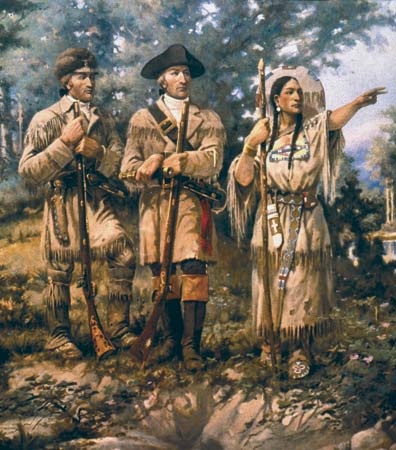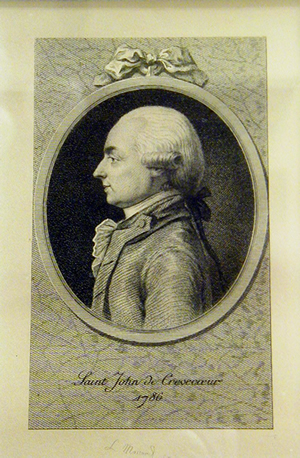For many years, I thought the American vice (which most of my countrymen still call a virtue) of having things both ways sprang from the mind of Alexander Hamilton, not his nemesis, Thomas Jefferson. But it turns out that it was Jefferson, the embodiment of contradiction, who set the mold of the American mentality.
 I’m reading the sterling account of the Lewis and Clark Expedition, “Undaunted Courage,” by Stephen E. Ambrose. It is one of those rare books that articulate big themes with an exquisite eye for detail.
I’m reading the sterling account of the Lewis and Clark Expedition, “Undaunted Courage,” by Stephen E. Ambrose. It is one of those rare books that articulate big themes with an exquisite eye for detail.
Meriwether Lewis was under the tutelage and direction of Thomas Jefferson, who had been planning an expedition into the unknown and uncharted Northwest Territories for more than a decade before Lewis and Clark set out in 1804.
Jefferson had just increased the size of the United States by a third with the Louisiana Purchase, but little was known about the lands he bought from Napoleon for 9.4 million dollars, and almost nothing about the territory beyond them. The ostensible goal of the expedition was to find, in Jefferson’s words, “a direct water communication from sea to sea formed by the bed of the Missouri and perhaps the Oregon.” But the real goal, as Ambrose succinctly says, was much more. “Jefferson wanted land. He wanted empire.”
Jefferson and Lewis held naïve, paternal and duplicitous ideas about Native Americans. The Lewis and Clark Expedition was essentially first contact by the US government with indigenous peoples west of the Mississippi, though many, like the agricultural Arikara on the Upper Missouri, had already been decimated from diseases like smallpox that Europeans brought with them to America.
The Plains Sioux were formidable warriors, and Jefferson and Lewis were already playing realpolitic, believing that if the Arikaras, who Americans knew about from French traders, could be broken away from their Sioux trading partners, and could be compelled to make peace with the Mandans, the whole balance of power in the region would shift in favor of the emerging trade empire. Sound familiar?
“Children,” Lewis despicably told the peoples he encountered, “the president is now your only father; he is the only friend to whom you can now look for protection, or from whom you can ask favours, or receive good counciles, and he will take care to serve you, and not deceive you.”
The expedition was equipped with a small mounted cannon, and they would set it off to impress and show the Indians “the magnitude and power of our country.” In fact, Lewis and Clark came within seconds of opening fire on recalcitrant Sioux with this and other guns during the first meeting, which would have ended expedition right there, fundamentally changing the history of the United States. Flash forward to 1890, when Hotchkiss Revolving Cannons were indiscriminately opened up on men, women and children at Wounded Knee, slaughtering hundreds of Lakota. These two events are bookends in the abysmal relations between the United States and Native Americans.
Contrast that history with this statement by Ambrose, in which he refers to Jefferson’s Monticello: “The political talk, about the nature of man and the role of government, has not been surpassed at any time or at any place since, and at its best the talk could stand to be compared to the level in ancient Athens.” That begs the question, could things have gone a different way? Can they still?
Perhaps, but we have the history we have, and the first American experiment is over. It had its day, and  brought material improvements to the human condition, but it has ended badly, leaving the world and humanity spiritually worse for it having been carried out. Most of humankind, including billions of Chinese and (subcontinent) Indians, may ape our individualism and consumerism now, but they pursue a path that has already reached a dead end.
brought material improvements to the human condition, but it has ended badly, leaving the world and humanity spiritually worse for it having been carried out. Most of humankind, including billions of Chinese and (subcontinent) Indians, may ape our individualism and consumerism now, but they pursue a path that has already reached a dead end.
I recently had a conversation with a smart, successful woman, a therapist no less, who could not understand why she can’t have things both ways. Most Americans feel the same way. If I want one thing today, and the opposite tomorrow, I should be able to have both, simply because my self-centered whim is the most important thing. That’s not just a personal failing; it’s the central philosophical and moral failure of the culture and nation. The condescending manipulation that inevitably arises from such a belief began early, with American attitudes toward peoples that had lived here for thousands of years before we Europeans arrived.
The question now is: Is there a second American experiment? And what on God’s browning earth would that look like? Going our own separate ways and making individual choices is a prescription not just for continued communal and ecological decline; it’s unworkable even on the individual level.
The death of a nation’s soul, like the death of an individual’s soul, is not necessarily permanent. From the ashes of the old, a new human being and people can emerge.
Does the promise of the New World, which Lincoln called the last best hope of the earth (though it has begun to feel older than the Old World), still survive in a few people and a few pockets across this continent, in both its indigenous and immigrant peoples?
Perhaps, but the death of the old dream of material riches and universal democracy has become the world’s nightmare, and therefore has to be fully acknowledged at an emotional level. Certainly America is not responsible for all the horrors of the world, but especially since 9.11, we have been the greatest catalyst for evil. That must be faced and ended now, if there is to be a new beginning here, and perhaps anywhere in the present age.
The second American experiment is not expansionist; indeed, it isn’t even external. It does not seek empty wealth, or to maintain military dominance. It seeks not to revive ideals—the American ideal, or even the Greek ideal—but to awaken insight within the human being, for all humanity.
At the darkest hour, when the prospects for the nation and world appear the bleakest, can there be a creative explosion? Possibly only then.
Martin LeFevre

